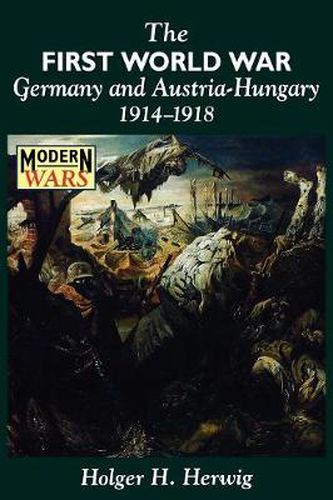Readings Newsletter
Become a Readings Member to make your shopping experience even easier.
Sign in or sign up for free!
You’re not far away from qualifying for FREE standard shipping within Australia
You’ve qualified for FREE standard shipping within Australia
The cart is loading…






The Great War toppled four empires, cost the world 24 million lives, and
sowed some of the seeds of another worldwide conflagration 20 years
later. Yet, until now, there has been no comprehensive treatment of how
Germany and Austria-Hungary - two of the key belligerents - conducted
the war and what defeat meant to them.
How did the
Hohenzollern and Habsburg empires conceive of and conduct ‘total war’?
What impact did the prolonged fighting have on their societies? Drawing
on his own archival research over the past decade, Holger Herwig
analyses why Vienna opted for war in 1914 and why Berlin took the
calculated risk to back that decision.
The war plans and
military campaigns on both Eastern and Western fronts are examined in
detail and key battles, some of the bloodiest and most wasteful in
military history, are narrated and analysed.
On the home
front, the mobilization of the civilian populations behind the war
effort had profound social consequences. The militarization of the key
war-related industries led to an industrial women’s labour force
emerging in both countries, deeply affecting the role of women in
Germanic society.
“The great seminal catastrophe of the
twentieth century’, as American statesman George F Kennan described the
war, has had no shortage of accounts seen chiefly from Allied
perspectives. In using Vienna and Berlin as his vantage points, Herwig
has comprehensively shown for the first time the other side of that
prodigiously wasteful conflict.
$9.00 standard shipping within Australia
FREE standard shipping within Australia for orders over $100.00
Express & International shipping calculated at checkout
The Great War toppled four empires, cost the world 24 million lives, and
sowed some of the seeds of another worldwide conflagration 20 years
later. Yet, until now, there has been no comprehensive treatment of how
Germany and Austria-Hungary - two of the key belligerents - conducted
the war and what defeat meant to them.
How did the
Hohenzollern and Habsburg empires conceive of and conduct ‘total war’?
What impact did the prolonged fighting have on their societies? Drawing
on his own archival research over the past decade, Holger Herwig
analyses why Vienna opted for war in 1914 and why Berlin took the
calculated risk to back that decision.
The war plans and
military campaigns on both Eastern and Western fronts are examined in
detail and key battles, some of the bloodiest and most wasteful in
military history, are narrated and analysed.
On the home
front, the mobilization of the civilian populations behind the war
effort had profound social consequences. The militarization of the key
war-related industries led to an industrial women’s labour force
emerging in both countries, deeply affecting the role of women in
Germanic society.
“The great seminal catastrophe of the
twentieth century’, as American statesman George F Kennan described the
war, has had no shortage of accounts seen chiefly from Allied
perspectives. In using Vienna and Berlin as his vantage points, Herwig
has comprehensively shown for the first time the other side of that
prodigiously wasteful conflict.